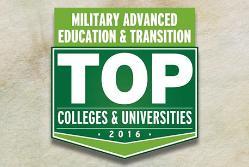January 21, 2016
Military Advanced Education and Transition Guide 2016: SUNY Empire State College a Top School

(SARATOGA SPRINGS, N.Y. – Jan. 22, 2016) SUNY Empire State College has earned the designation of “Top School” from Military Advanced Education and Transition’s “2016 Guide to Top Colleges and Universities.”
In designating SUNY Empire a top school, MAE evaluated the college’s success educating and supporting military students in the following areas:
- military culture
- financial assistance
- flexibility
- general support
- online support
- on-campus support.
“We provide our veteran and military students with more than a highly regarded education,” said Merodie A. Hancock, president of the college. “Military Advanced Education and Transition’s guide lists six key areas where SUNY Empire supports military and veteran student success. Credit for the success of our military and veteran students goes to our outstanding faculty and staff and, of course, to the students themselves and their families. For us, creating and sustaining a veteran- and military-focused culture is more than just a point of great pride, it is an honor and a privilege and our way of expressing appreciation to these students.
More than 600 institutions, from all sectors of higher education, participated in the survey MAE used to produce their guide.
“Our goal is to be a dynamic resource for active service members and those who have moved from the military to civilian careers by helping them find the school that best fits their plans for the future,” said Kelly Fodel, editor of Military Advanced Education and Transition magazine.
In addition to a traditional magazine format, the guide is published as a searchable, online database. Students have access to all the survey questions and answers provided by SUNY Empire and all other institutions, as well as explanations about issues important to active-duty members of the service, such as activation and deployment policies.
In addition to strengths listed in the guide, the college supports veterans and members of the military community through its:
- award-winning Office of Veteran and Military Education
- Credit Where Credit is Due: Veteran and Service Member Pathway to the MBA
- Graduate Certificate in Veterans Services
- Student Veterans and Military Club.
About SUNY Empire State College
Empire State College, the nontraditional, open college of the SUNY system, educates more than 20,000 students worldwide at eight international sites, more than 35 locations in the state of New York, online, as well as face to face and through a blend of both, at the associate, bachelor’s and master’s levels.
The average age of an undergraduate student at the college is 35 and graduate students’ average age is 40.
Most Empire State College students are working adults. Many are raising families and meeting civic commitments in the communities where they live, while studying part time.
In addition to awarding credit for prior college-level learning, the college pairs each undergraduate student with a faculty mentor who supports that student throughout his or her college career.
Working with their mentors, students design an individual degree program and engage in guided independent study and course work onsite, online or through a combination of both, which provides the flexibility for students to choose where, when and how to learn.
Students have the opportunity to enroll five times during the year.
The college’s 77,000 alumni are active in their communities as entrepreneurs, politicians, business professionals, artists, nonprofit agency employees, teachers, veterans and active military, union members and more.
The college was first established in 1971 by the SUNY Board of Trustees with the encouragement of the late Ernest L. Boyer, chancellor of the SUNY system from 1970 to 1977. Boyer also served as United States commissioner of education during the administration of President Jimmy Carter and then as president of the Carnegie Foundation for the Advancement of Teaching.
More information about the college is available at www.esc.edu.